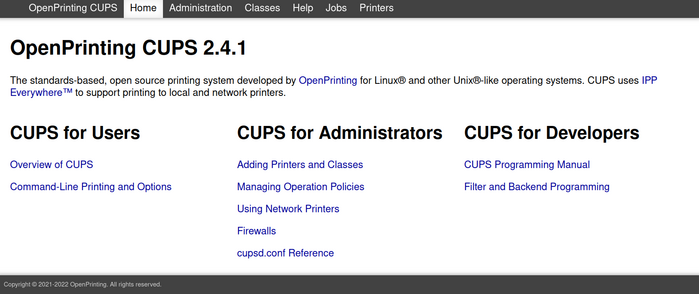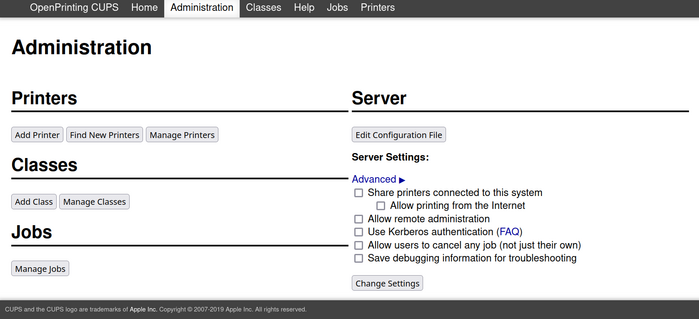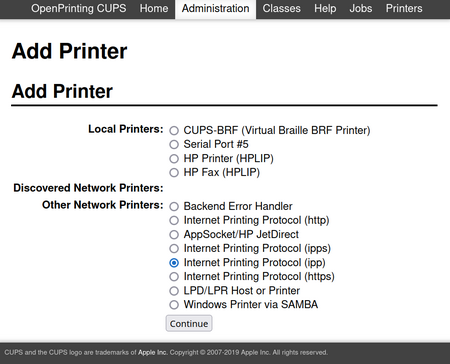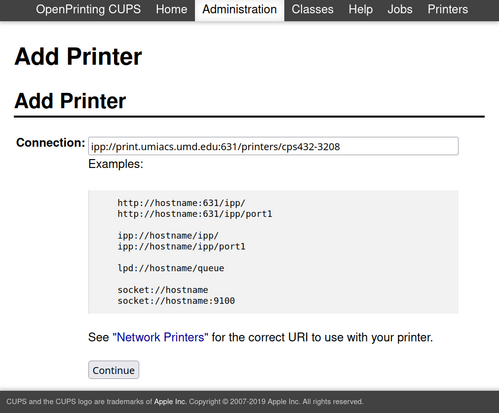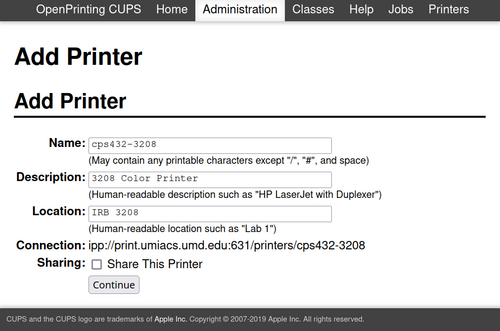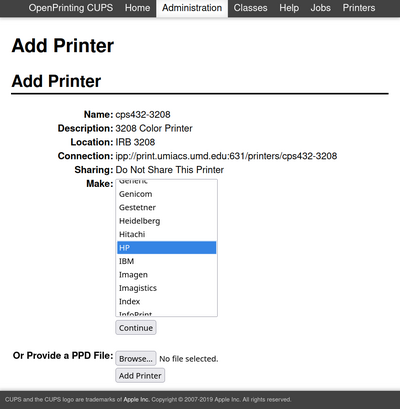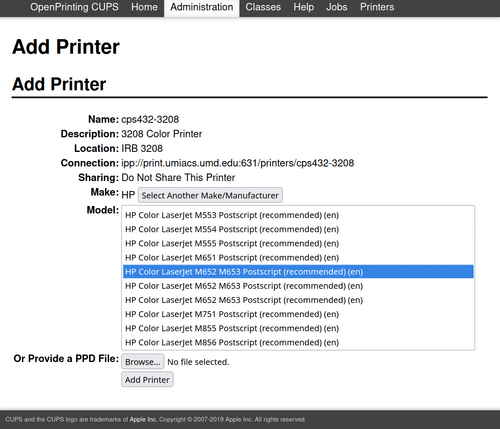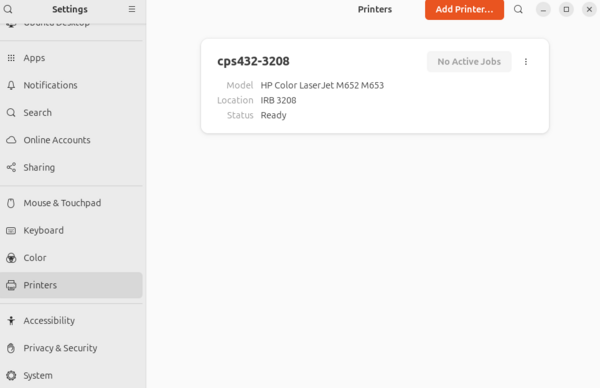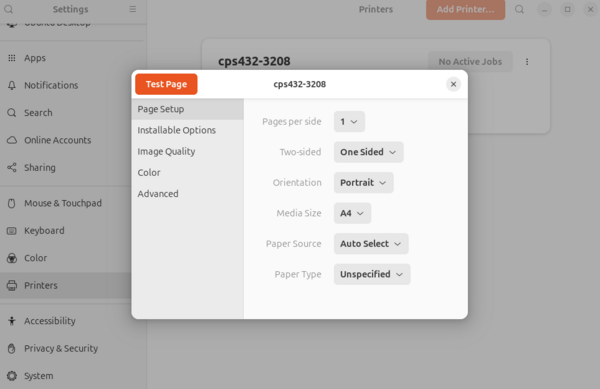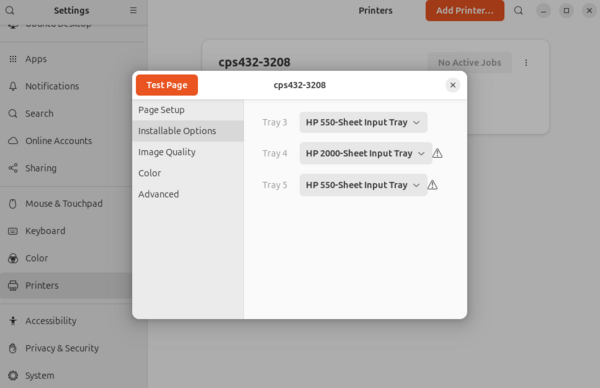UbuntuPrinting: Difference between revisions
Jump to navigation
Jump to search
No edit summary |
No edit summary |
||
| (35 intermediate revisions by 10 users not shown) | |||
| Line 1: | Line 1: | ||
Printing from your | ==Overview== | ||
Printing from your self-supported Ubuntu laptop or desktop is supported. If you are sitting at a UMIACS-supported Ubuntu desktop, please see our common UNIX/Linux printing documentation for [[CUPS]] instead. | |||
[[ | This documentation may not work for all versions of Ubuntu. If you run into any issues, please [[HelpDesk | contact staff]]. | ||
===Printer Accessibility=== | |||
In order to print you '''need to be on the UMIACS internal network''', either via a wired proxy drop or an [[SecureShellTunneling | SSH tunnel]]. | |||
==Connecting to a printer== | |||
In order for printing to function properly, you must complete '''ALL''' of the following steps: | |||
# Open a web browser and go to <code>localhost:631</code>. This will bring up the CUPS home page. | |||
#: [[File:Cups_home_page_12-2024.png|700px]] | |||
# At the top of the screen, select '''Administration'''. If you're given a login prompt, enter your username and password for the computer. Select the 'Add Printer' button. | |||
#: [[File:Cups_admin_page_12-2024.png|700px]] | |||
# Open a new tab in your web browser and navigate to http://print.umiacs.umd.edu/printers. | |||
# Find the '''name''' of the printer that you wish to connect to. If you are unsure of which one to pick, see the [[PrinterQueueNaming | selecting a print queue]] page. | |||
# Navigate back to the 'Add Printer' page. Select the 'Internet Printing Protocol (ipp)' radio button, then hit the 'Continue' button. | |||
#: [[File:Cups_ipp_radio_button_12-2024.png|450px]] | |||
# Next to the 'Connection:' field, enter <code>ipp://print.umiacs.umd.edu:631/printers/</code> with the name of the printer added at the end. For instance, to add cps432-3208 (color printer in IRB 3208), you would enter <code>ipp://print.umiacs.umd.edu:631/printers/cps432-3208</code> in the field. Hit 'Continue'. | |||
[[ | #: [[File:Cups_connection_entry_12-2024.png|500px]] | ||
[[ | # Enter the printer '''name''' in the 'Name:' field. It's recommended to enter useful information in the 'Description:' and 'Location:' fields, but it's not required. Keep 'Share This Printer' unchecked. Hit 'Continue'. | ||
[[ | #: [[File:Cups_name_entry_12-2024.png|500px]] | ||
[[ | # In the 'Make:' list, select the brand of the printer as noted in step 4, and click 'Continue'. | ||
#: [[File:Cups_make_selection_12-2024.png|400px]] | |||
# In the 'Model:' list, select the specific model of the printer as noted in step 4. Then click 'Add Printer'. | |||
#: [[File:Cups_model_selection_12-2024.png|500px]] | |||
# The printer likely requires additional configuration. When adding the printer through the CUPS interface, it is added system-wide. It can be viewed and modified in the 'Printers' menu of the Ubuntu settings, where in Ubuntu 24.04, there is a kebab menu for each printer added. In the kebab menu, select 'Printing Options'. We recommend changing the printer options here instead of in the CUPS browser interface, though you can make changes there if you prefer. | |||
#: [[File:Ubuntu_printer_options-12-2024.png|600px]] | |||
# In 'Page Setup', at minimum, change the media size to 'US Letter', unless you're specifically printing from a tray which doesn't use letter paper. Change the 'Pages per side', 'Two-sided', and 'Orientation' settings according to your preferences. | |||
#: [[File:Ubuntu_page_setup_12-2024.png|600px]] | |||
# The available settings depend on the printer you added. For cps432-3208, there is an 'Installable Options' menu. Use this to configure the trays according to the printer's tray configuration. | |||
#: [[File:Ubuntu_tray_setup_12-2024.png|600px]] | |||
# Verify this process by printing a test page, which is the top left button in the 'Printing Options' submenu in Ubuntu 24.04. You should get the default Ubuntu test page. If you just get a page with a string of text then the printer is not properly configured, and you should verify the settings. | |||
Latest revision as of 17:37, 3 March 2025
Overview
Printing from your self-supported Ubuntu laptop or desktop is supported. If you are sitting at a UMIACS-supported Ubuntu desktop, please see our common UNIX/Linux printing documentation for CUPS instead.
This documentation may not work for all versions of Ubuntu. If you run into any issues, please contact staff.
Printer Accessibility
In order to print you need to be on the UMIACS internal network, either via a wired proxy drop or an SSH tunnel.
Connecting to a printer
In order for printing to function properly, you must complete ALL of the following steps:
- Open a web browser and go to
localhost:631. This will bring up the CUPS home page. - At the top of the screen, select Administration. If you're given a login prompt, enter your username and password for the computer. Select the 'Add Printer' button.
- Open a new tab in your web browser and navigate to http://print.umiacs.umd.edu/printers.
- Find the name of the printer that you wish to connect to. If you are unsure of which one to pick, see the selecting a print queue page.
- Navigate back to the 'Add Printer' page. Select the 'Internet Printing Protocol (ipp)' radio button, then hit the 'Continue' button.
- Next to the 'Connection:' field, enter
ipp://print.umiacs.umd.edu:631/printers/with the name of the printer added at the end. For instance, to add cps432-3208 (color printer in IRB 3208), you would enteripp://print.umiacs.umd.edu:631/printers/cps432-3208in the field. Hit 'Continue'. - Enter the printer name in the 'Name:' field. It's recommended to enter useful information in the 'Description:' and 'Location:' fields, but it's not required. Keep 'Share This Printer' unchecked. Hit 'Continue'.
- In the 'Make:' list, select the brand of the printer as noted in step 4, and click 'Continue'.
- In the 'Model:' list, select the specific model of the printer as noted in step 4. Then click 'Add Printer'.
- The printer likely requires additional configuration. When adding the printer through the CUPS interface, it is added system-wide. It can be viewed and modified in the 'Printers' menu of the Ubuntu settings, where in Ubuntu 24.04, there is a kebab menu for each printer added. In the kebab menu, select 'Printing Options'. We recommend changing the printer options here instead of in the CUPS browser interface, though you can make changes there if you prefer.
- In 'Page Setup', at minimum, change the media size to 'US Letter', unless you're specifically printing from a tray which doesn't use letter paper. Change the 'Pages per side', 'Two-sided', and 'Orientation' settings according to your preferences.
- The available settings depend on the printer you added. For cps432-3208, there is an 'Installable Options' menu. Use this to configure the trays according to the printer's tray configuration.
- Verify this process by printing a test page, which is the top left button in the 'Printing Options' submenu in Ubuntu 24.04. You should get the default Ubuntu test page. If you just get a page with a string of text then the printer is not properly configured, and you should verify the settings.
